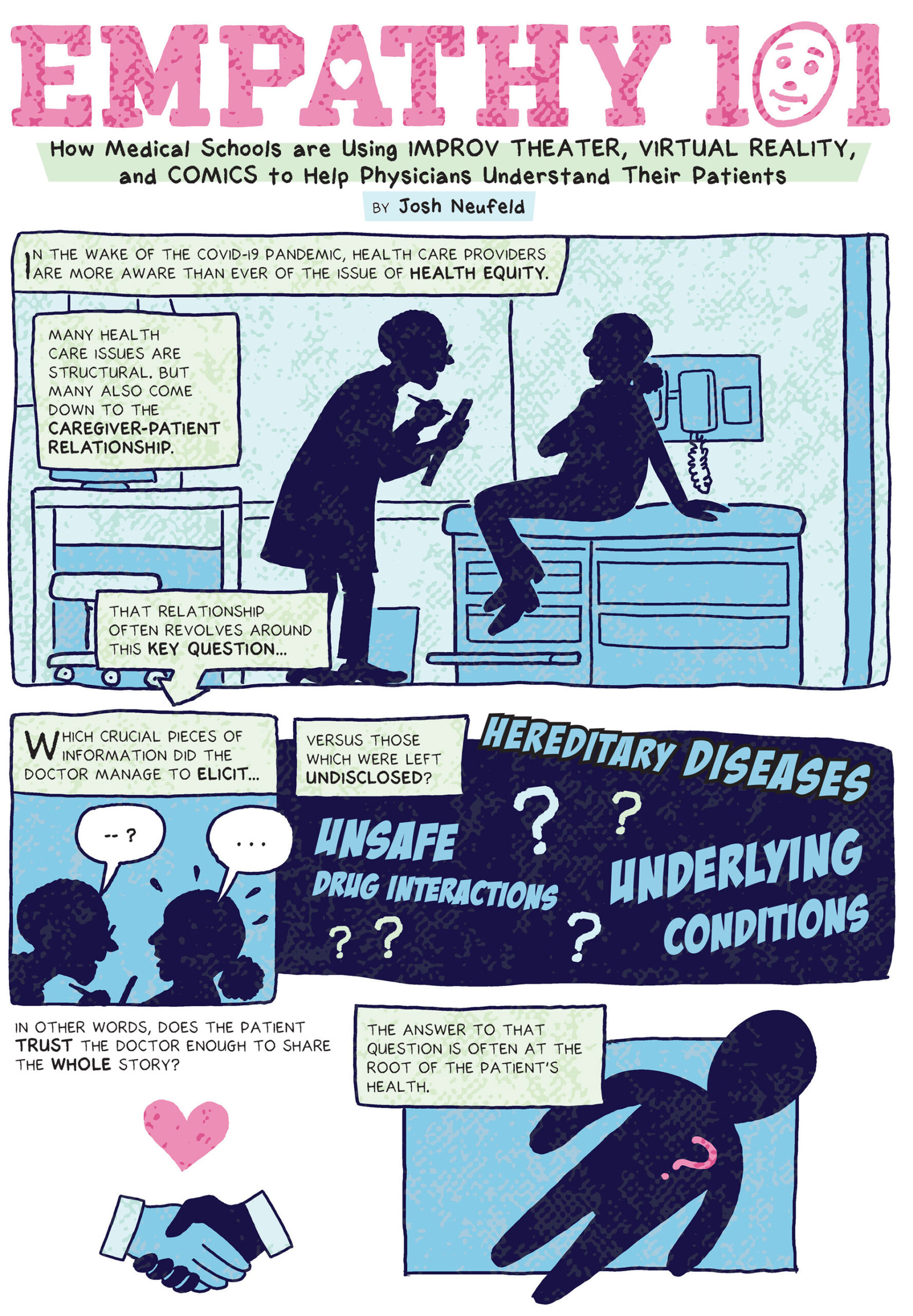
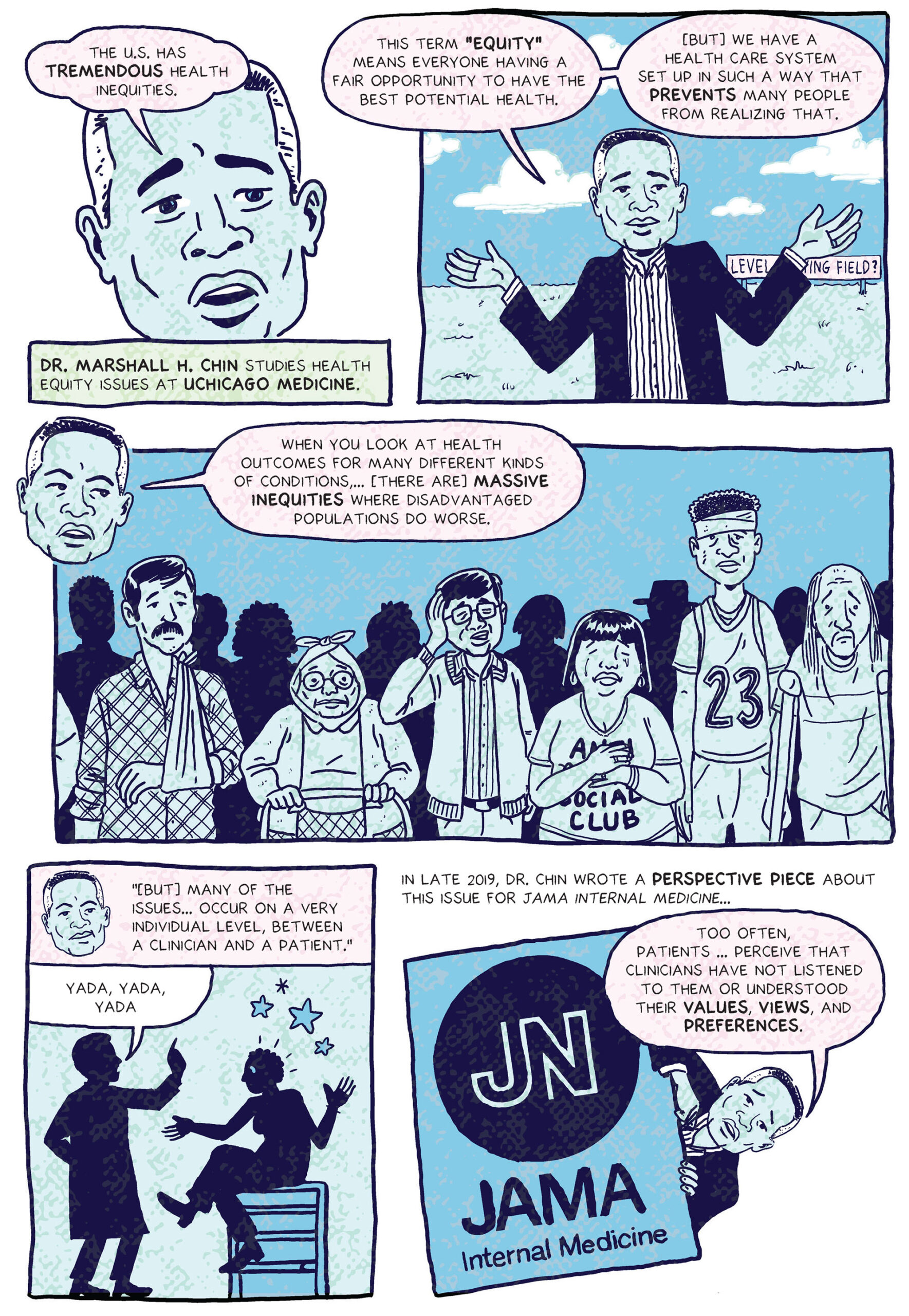
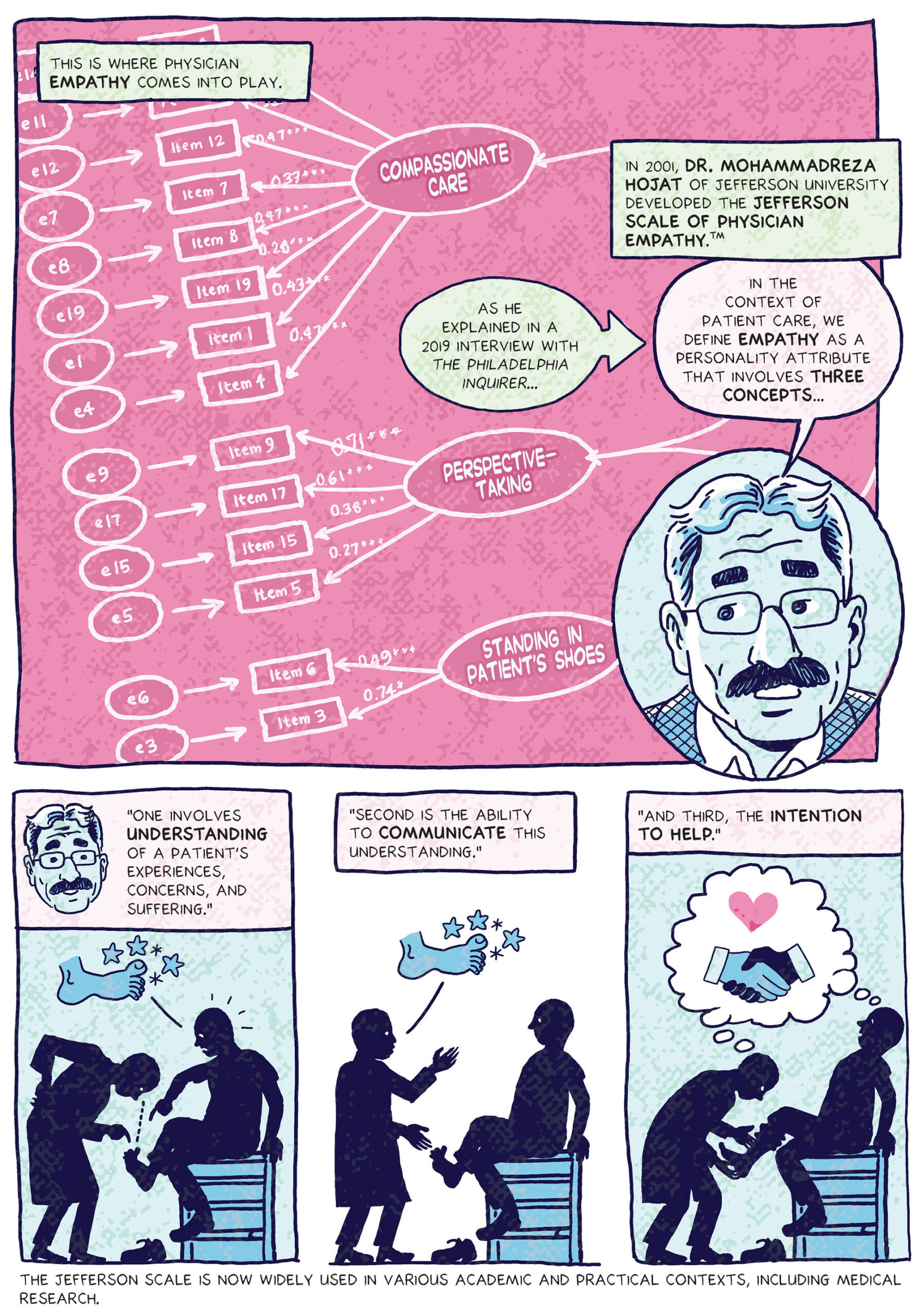
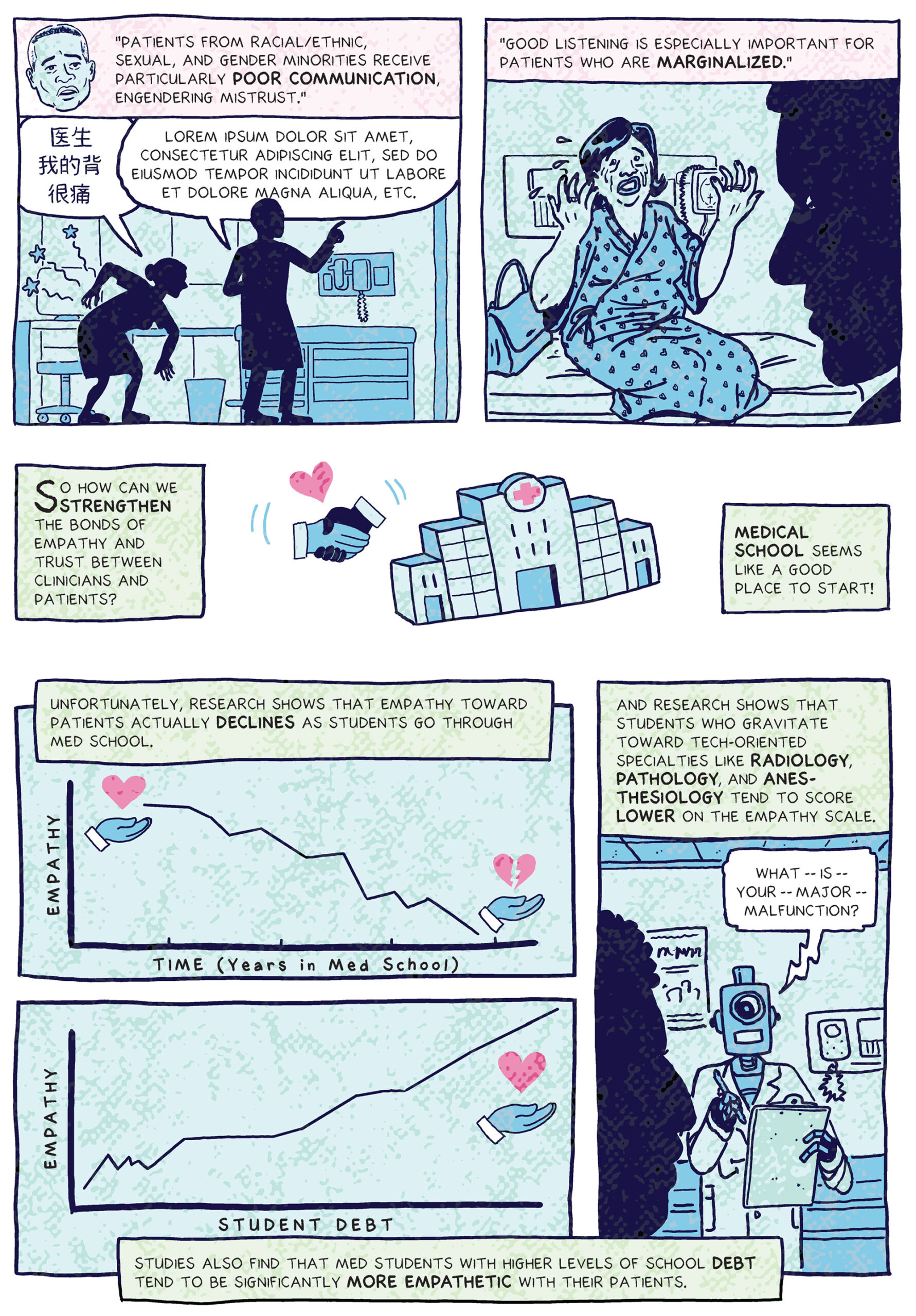
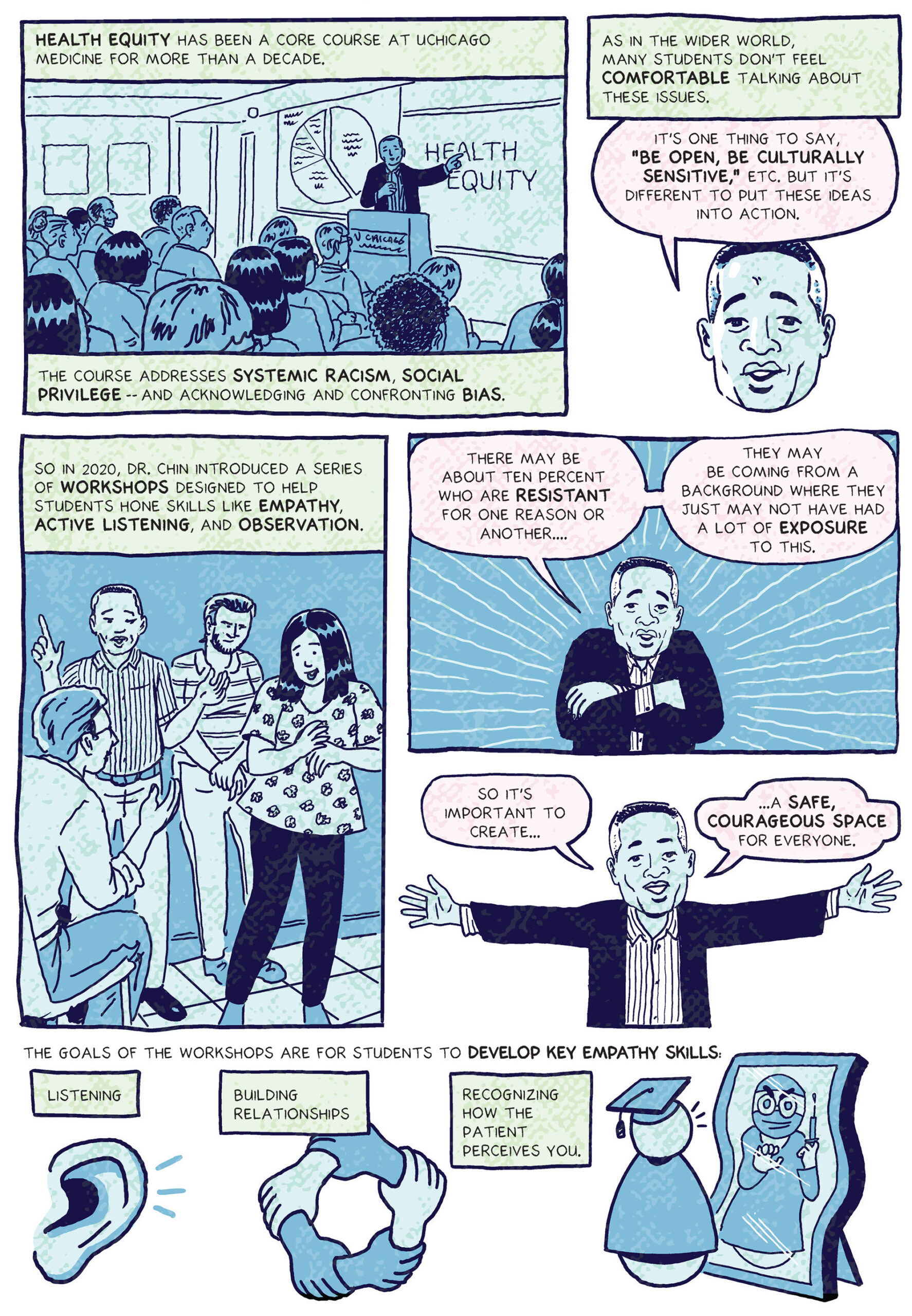
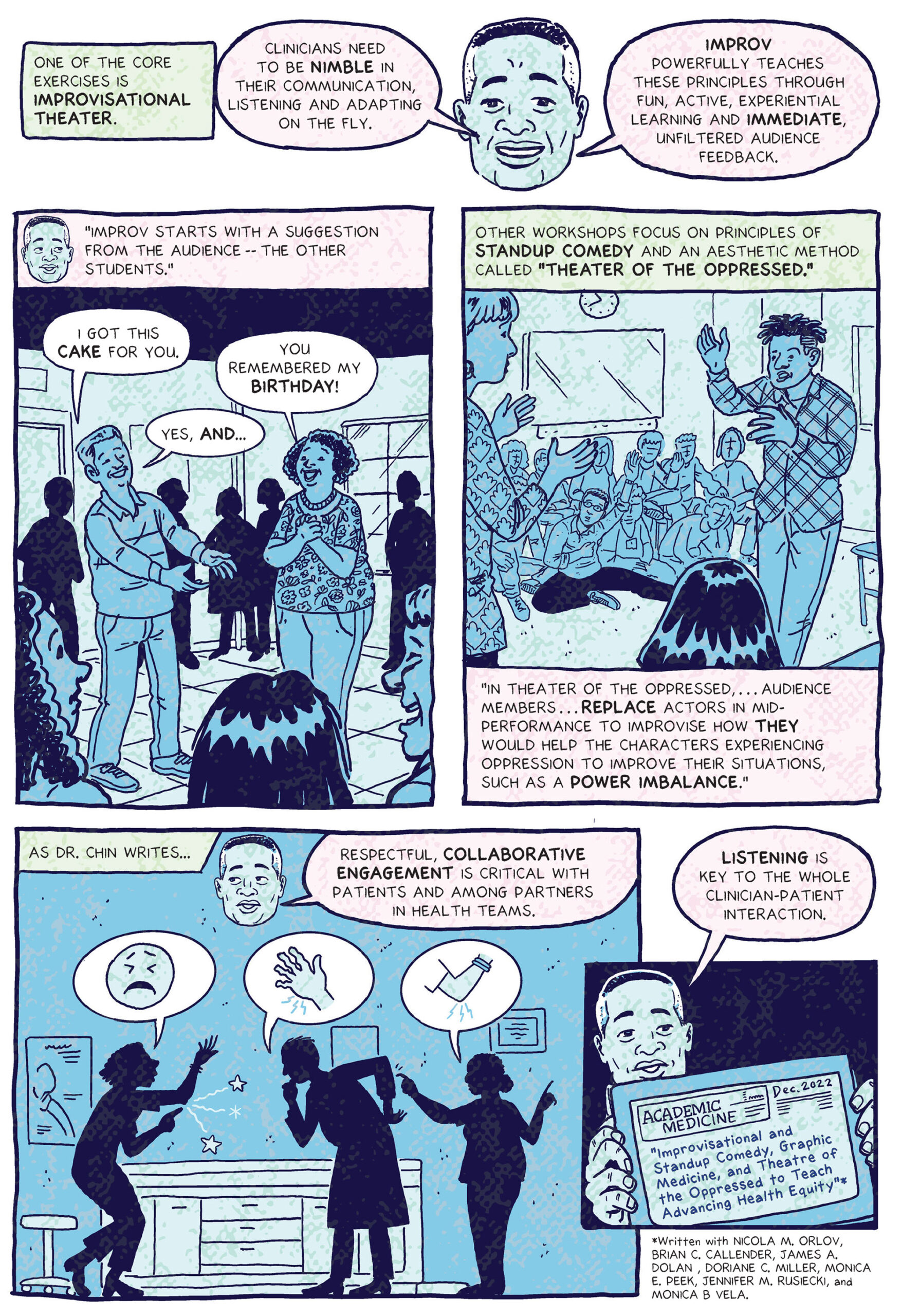
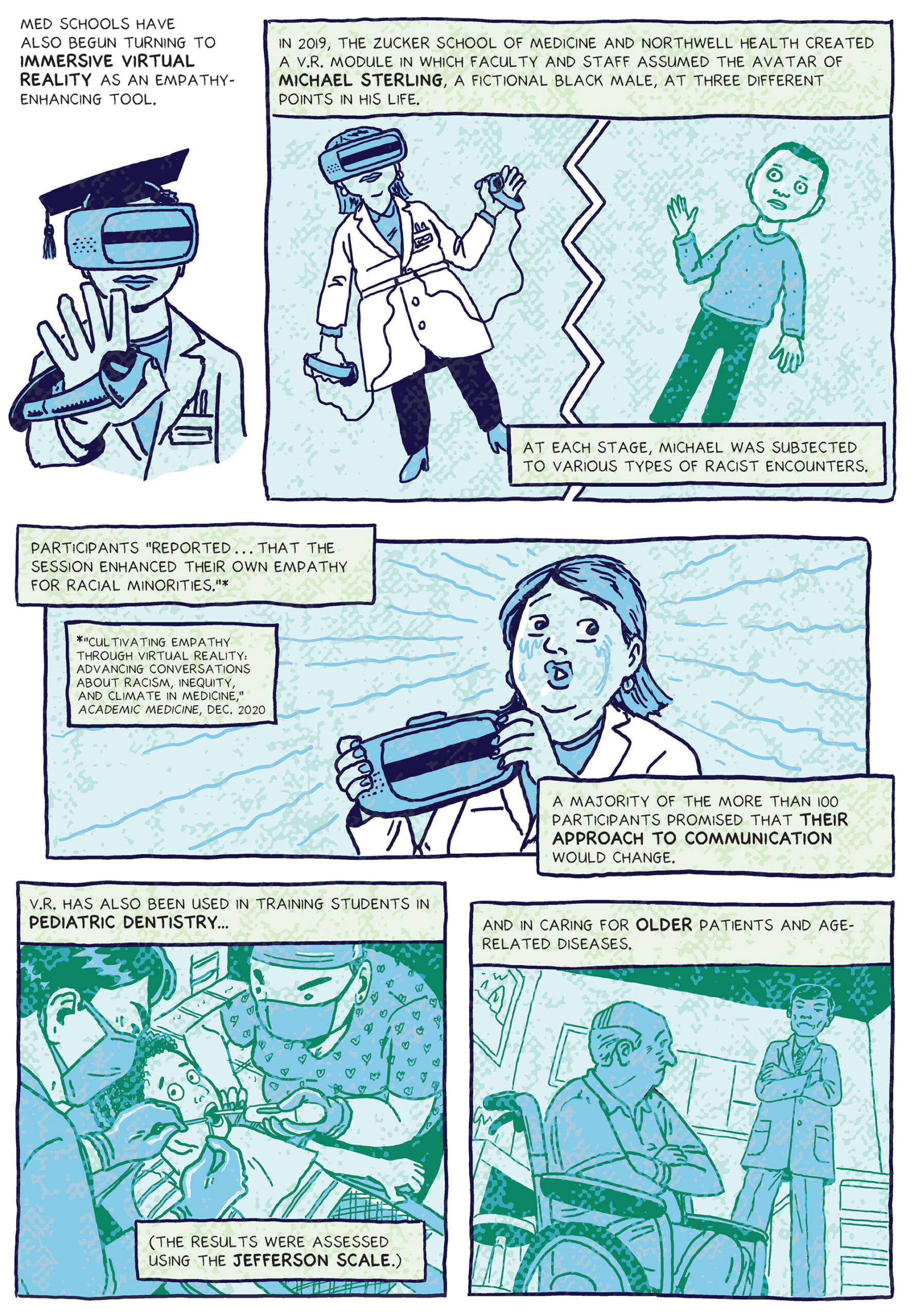
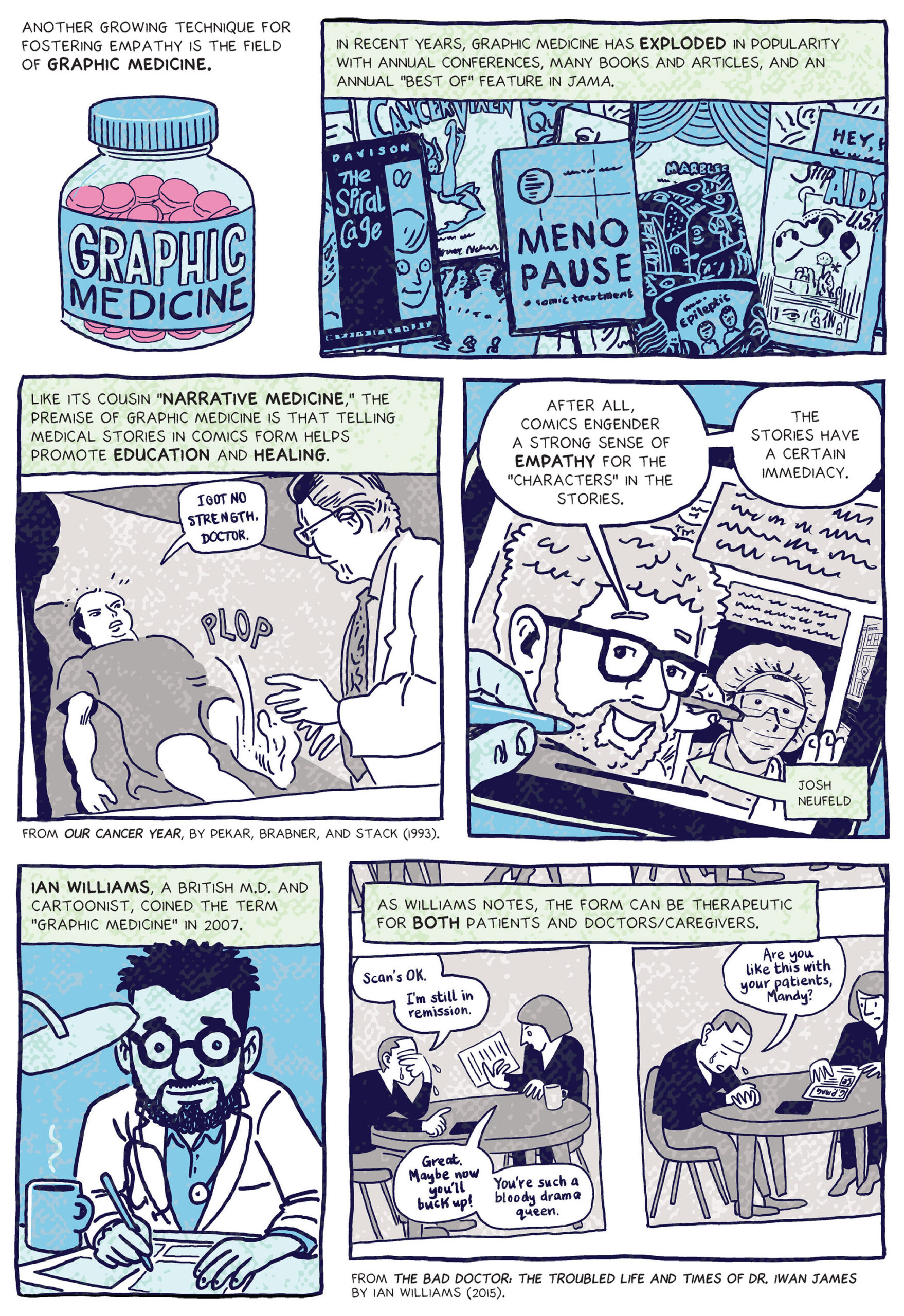
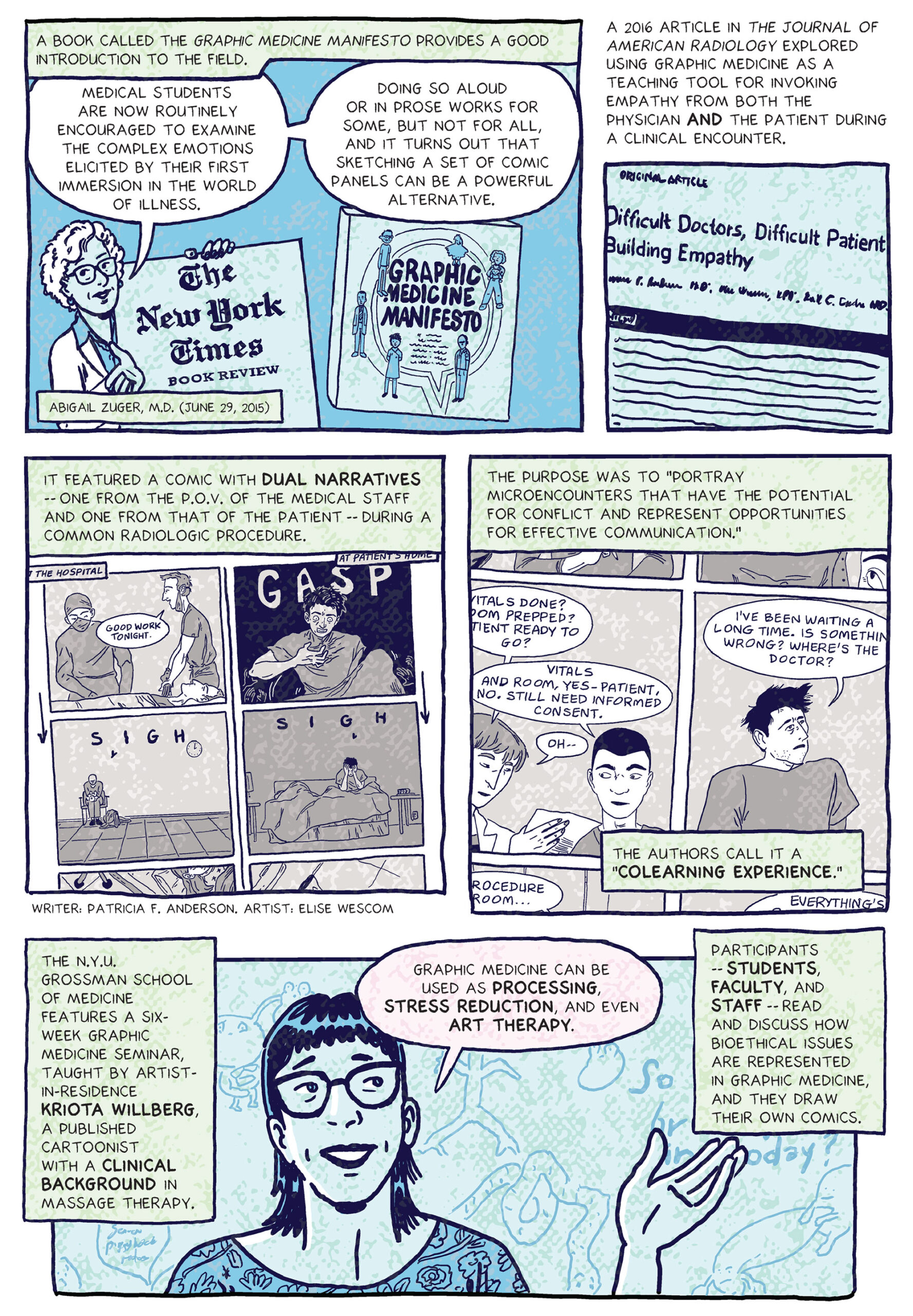
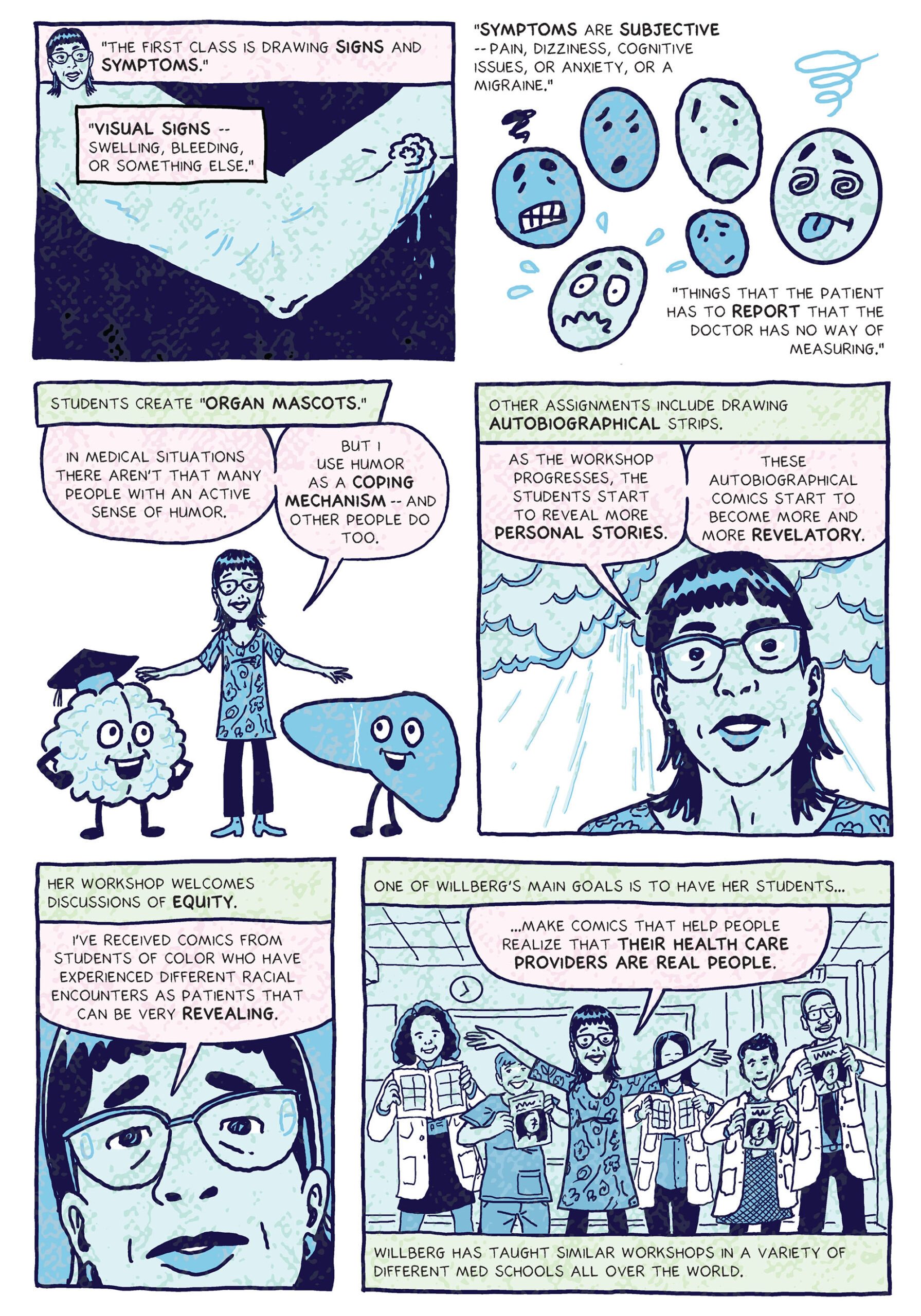
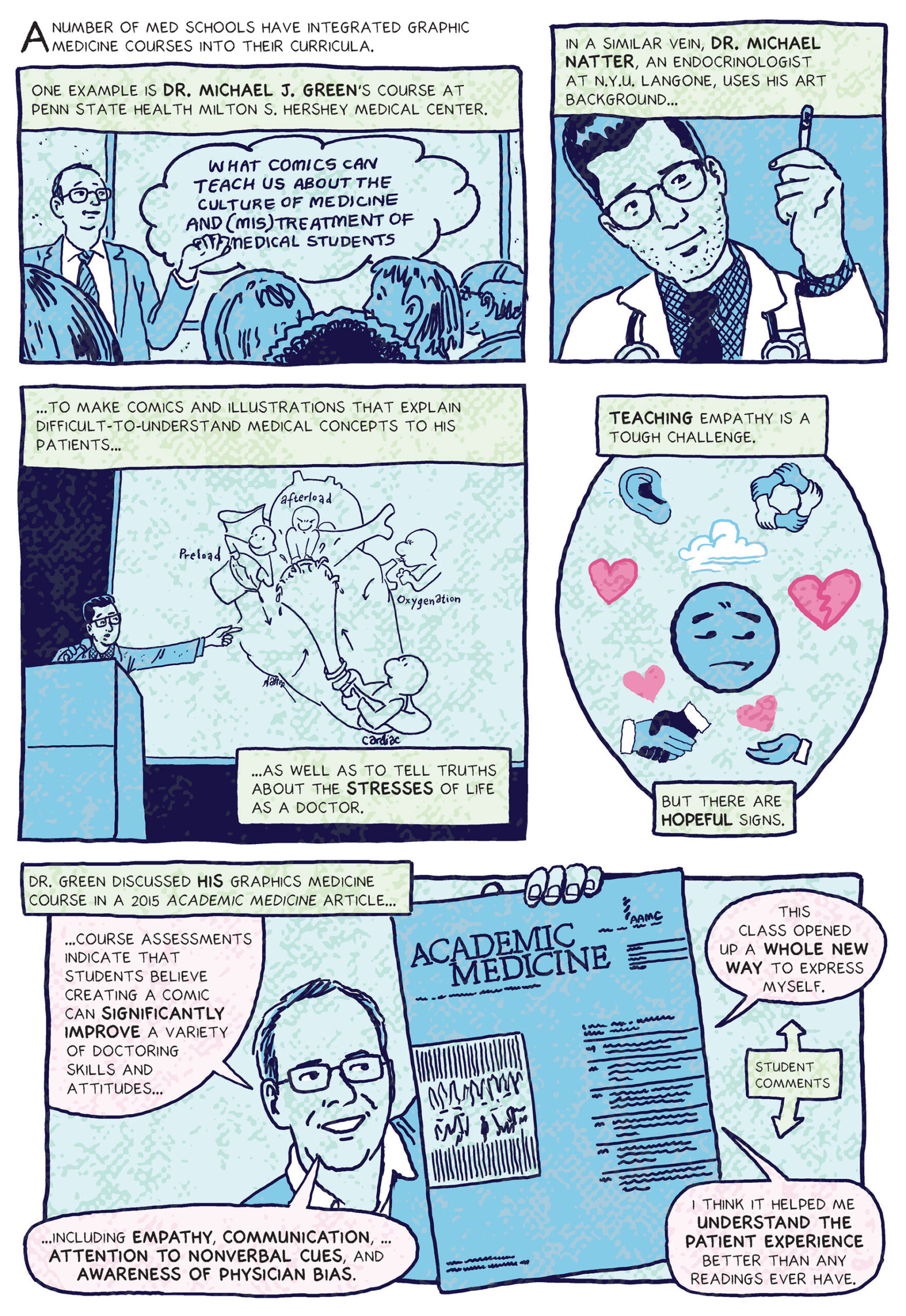
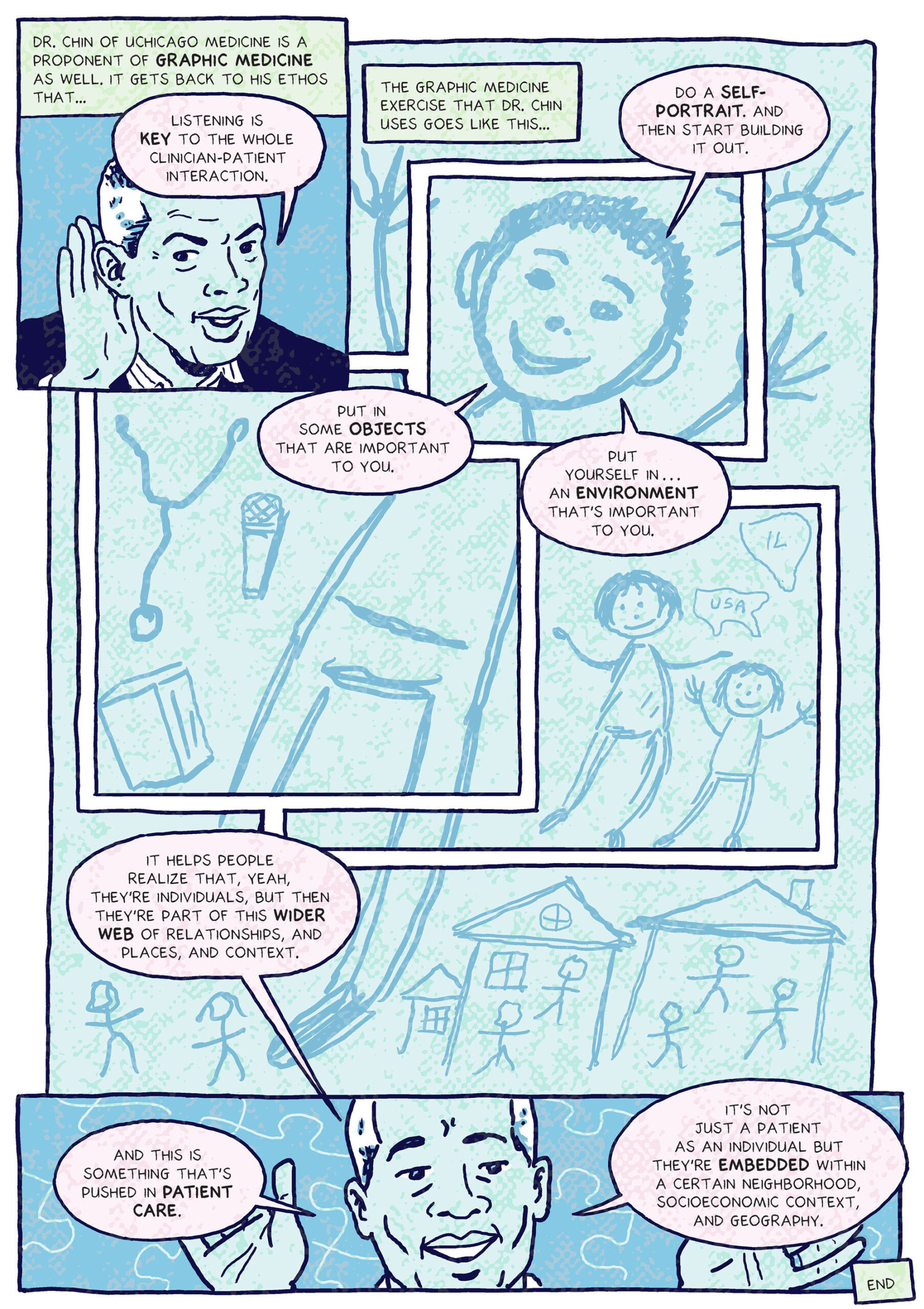
Do you like this piece so much that you want to republish it? Great!
This piece is licensed under a Creative Commons Attribution-No Derivatives 4.0 International License, which means you’re welcome and encouraged to republish it, provided you credit and/or link back to the original source. Our republishing guidelines can be found here.
Are you looking to republish the comic in a print publication or to distribute copies for a class you’re teaching? Download a high-resolution PDF here.
About the comic:
In “Empathy 101,” comics journalist Josh Neufeld uses the comic book form to highlight how medical schools across the U.S. have explored improv comedy, virtual reality and, yes, comics to improve communication and understanding between physicians and their patients.
The comic self-reflectively discusses the growing field of graphic medicine, which uses comics as a tool to tell personal stories about health care experiences, as well as to distill and discuss complex medical topics. Neufeld considers comics an ideal medium for a nonfiction piece about topic at hand. As he explains, comics “engender a strong sense of empathy for the ‘characters’ in the story.”
Neufeld’s well-sourced comic draws on a large body of published academic research, newspaper articles, and interviews with expert sources, including Dr. Marshall Chin, a physician and professor who teaches health equity courses at U. Chicago Medicine; Dr. Mohammadreza Hojat, a research professor at Thomas Jefferson University, who developed the Jefferson Scale of Empathy to measure the capacity in health care providers; and Kriota Willberg, a visual artist and clinical massage therapist who practices and teaches graphic medicine.
The characters’ quotes, appearing in shaded pink speech bubbles or pink rectangles, come directly from their interviews with Neufeld, from their interviews in newspaper articles, or from research papers authored by the characters. The text in light green represents Neufeld’s own narrative.
Neufeld is the creator of several graphic medicine comics, including “Vaccinated at the Ball: A True Story about Trusted Messengers,” which won the 2023 GMIC Award for Excellence in Graphic Medicine, Short Form, from the Graphic Medicine International Collective.
Sources:
“Lessons From Improv Comedy to Reduce Health Disparities.” Marshall H. Chin. JAMA Internal Medicine, December 2019.
“5 Questions: How Doctors’ Empathy Improves Patient Care: Studies Have Shown That Physicians Who Score Higher on Empathy Have More Positive Patient Outcomes.” Sandy Bauers. The Philadelphia Inquirer, October 2019.
“Does Empathy Decline in the Clinical Phase of Medical Education? A Nationwide Multi-Institutional Cross-Sectional Study of Students at DO-Granting Medical Schools.” Mohammadreza Hojat, Stephen C. Shannon, Jennifer DeSantis, Mark R. Speicher, Lynn Bragan and Leonard H. Calabrese. Academic Medicine, June 2020.
“Changes in Empathy During Medical Education: An Example From Turkey.” Fusun Artiran Igde and Mustafa Kursat Sahin. Pakistan Journal of Medical Sciences, September/October 2017.
“Empathy Decline and its Reasons: A Systematic Review of Studies with Medical Students and Residents.” Melanie Neumann, Friedrich Edelhäuse. Diethard Tauschel, Martin R Fischer, Markus Wirtz, Christiane Woopen, Aviad Haramati, and Christian Scheffer. Academic Medicine, August 2011.
“Characterizing Changes in Student Empathy Throughout Medical School.” Daniel C. R. Chen, Daniel S. Kirshenbaum, Jun Yan, Elaine Kirshenbaum, and Robert H. Aseltine. Medical Teacher, March 2012.
“A Cross-sectional Measurement of Medical Student Empathy.” Daniel Chen, Robert Lew, Warren Hershman, and Jay Orlander. Journal of General Internal Medicine, July 2007.
“Improvisational and Standup Comedy Graphic Medicine and Theatre of the Oppressed to Teach Advancing Health Equity.” Marshall H. Chin, Nicola M. Orlov, Brian C. Callender, James Dolan, Doriane C. Miller, Monica E. Peek, Jennifer M. Rusiecki and Monica B. Vela. Academic Medicine, December 2022.
“Cultivating Empathy Through Virtual Reality: Advancing Conversations About Racism Inequity and Climate in Medicine.” Robert O. Roswell, Courtney D. Cogburn, Jack Tocco, Johanna Martinez, Catherine Bangeranye, Jeremy N. Bailenson, Michael Wright, Jennifer H. Mieres and Lawrence Smith. Academic Medicine, November 2020.
“Increasing Empathy for Children in Dental Students Using Virtual Reality.” Shijia Hu and Bien Wen Pui Lai. International Journal of Pediatric Dentistry, February 2022.
“Using Virtual Reality in Medical Education to Teach Empathy.” Elizabeth Dyer, Barbara J. Swartzlander and Marilyn R. Gugliucci. Journal of the Medical Library Association, October 2018.
“Best of Graphic Medicine – The 2023 Graphic Medicine International Collective Awards.” Michael J. Green and Kevin Wolf. JAMA, December 2023.
“Our Cancer Year.” Harvey Pekar (author), Joyce Brabner (author), and Frank Stack (illustrator). Da Capo Press, 1994.
“The Bad Doctor: The Troubled Life and Times of Dr. Iwan James.” Ian Williams. Pennsylvania State University Press, 2015.
“Documenting serious issues with comics journalism: An interview with Josh Neufeld.” Carmen Nobel. The Journalist’s Resource, November 2020.
“A Tale of Two Pandemics: A Nonfiction Comic About Historical Racial Health Disparities.” by The Journalists’ Resource on Nov. 16, 2020: https://journalistsresource.org/race-and-gender/pandemics-comic-racial-health-disparities/
“Review: ‘The Bad Doctor’ and ‘Graphic Medicine Manifesto’.” Abigail Zuger. The New York Times Book Review, June 2015.
“The Graphic Medicine Manifesto.” MK Czerwiec, Ian Williams, Susan Merrill Squier, Michael J. Green, Kimberly R. Myers, and Scott T. Smith. Pennsylvania State University Press, 2015.
“Difficult Doctors, Difficult Patients: Building Empathy.” Patricia F. Anderson, Elise Wesco and Ruth C. Carlos. Journal of the American College of Radiology, December 2016.
“Comics and Medicine: Helping Med Students Form Their Professional Identities.” Penn State Health News, May 2015.
“Green Gets Serious About Comics: Professor Discusses Benefits of Graphic Medicine at National Institutes of Health.” Penn State, April 2018.
Dr. Green’s 7-class online higher education curriculum on graphic medicine, which can be found here.
“Don’t Understand How Diabetes Works? Dr. Michael Natter Can Draw It Out for You.” NYU Langone Health News Hub, November 2023.
“Comics and Medicine: Peering Into the Process of Professional Identity Formation.” Michael Green. Academic Medicine, June 2015.

Expert Commentary